Advertisement
The Secret To This Social Enterprise's Success Springs From Old Mattresses
Resume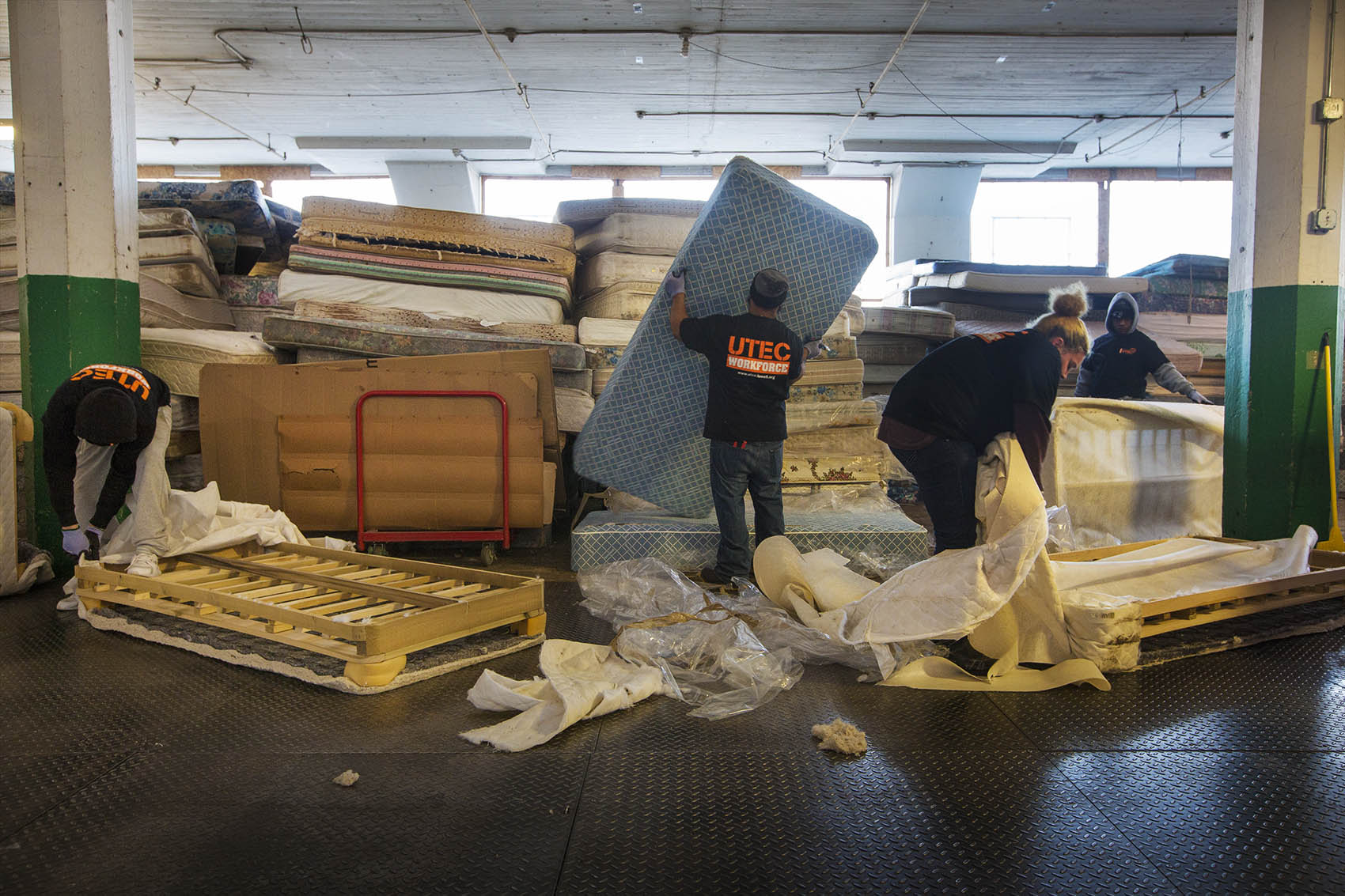
The drafty riverside warehouse in Lawrence looks like a scene out of the Hans Christian Andersen fable "The Princess and the Pea" — the place is stacked nearly floor to ceiling with mattresses.
"There's, I believe, around 700 mattresses on our floor right now, and we have more coming in all the time," says Ed Frechette, chief innovation officer of the Lowell-based social-enterprise known as UTEC.
Frechette watches as a forklift swivels and unloads a stack of worn mattresses.
A team of young workers wearing UTEC hoodies drags one off and begins shredding it with utility knives and bolt cutters. They tear through 25,000 a year.
"We'll break down mattresses and we'll get wood, we'll get foam," Frechette says. "They're essentially commodities, and there's just not a lot of money in the commodities market. That set of springs right there is probably worth about 75 cents."
And the high density foam is worthless, but the innovation officer has a value-added idea on how to reuse it: "for geriatric dog beds. So we'd love to up-cycle some of these materials and create another business."
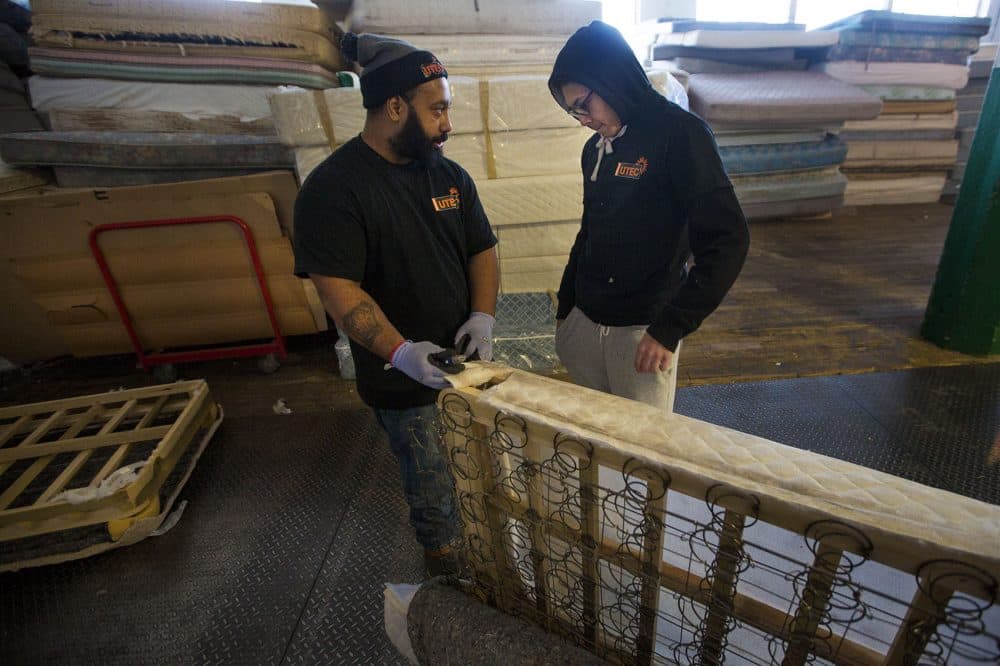
UTEC makes most of its money on the fees it charges for picking up old mattresses from hotels, towns and colleges, but its business model isn't about saving mattresses from landfills and incinerators. It's about recycling the lives of young gang members and inmates who work there.
"Mattress recycling is the job that a young person will have Day One upon their release from incarceration," says executive director Gregg Croteau, who started UTEC 17 years ago in Lowell with $40,000.
Its budget today: $5 million. About a third is earned at UTEC's social enterprises, where bottom-line business strategies are applied to have a societal impact.
UTEC has a commercial kitchen cafe, and a woodworking factory where young workers turn out cutting boards for Whole Foods. But everyone starts out in mattresses.
"We know that there's no waiting line for a young person who wants to get involved in a gang, so we have to be in that position to say, 'OK, upon release, they can go straight right into mattress recycling,'" Croteau says.
When Teamwork Is Needed
"Today's crew is nine strong, and then I have three guys on the truck right now, " says Jim Buccholz, the mattress warehouse operations manager.
He adds: "It's definitely a physical job, as you can see. But, as you can also see, there's a lot of people talking with each other. People are smiling, we try to make it as friendly as an atmosphere as possible."
One of the workers Buccholz is trying to keep engaged and employed is 21-year-old Rafael Canales. Canales has been in and out of jail many times and has been working in mattress recycling for several months. He hopes to make it into the UTEC culinary program.
"I like it here," Canales says. "They don't make you feel like a slave, you know what I'm saying. We work — that's what we're here for, you know — but at the same time, we're having fun while we're doing it."
Canales got his GED at UTEC as well.
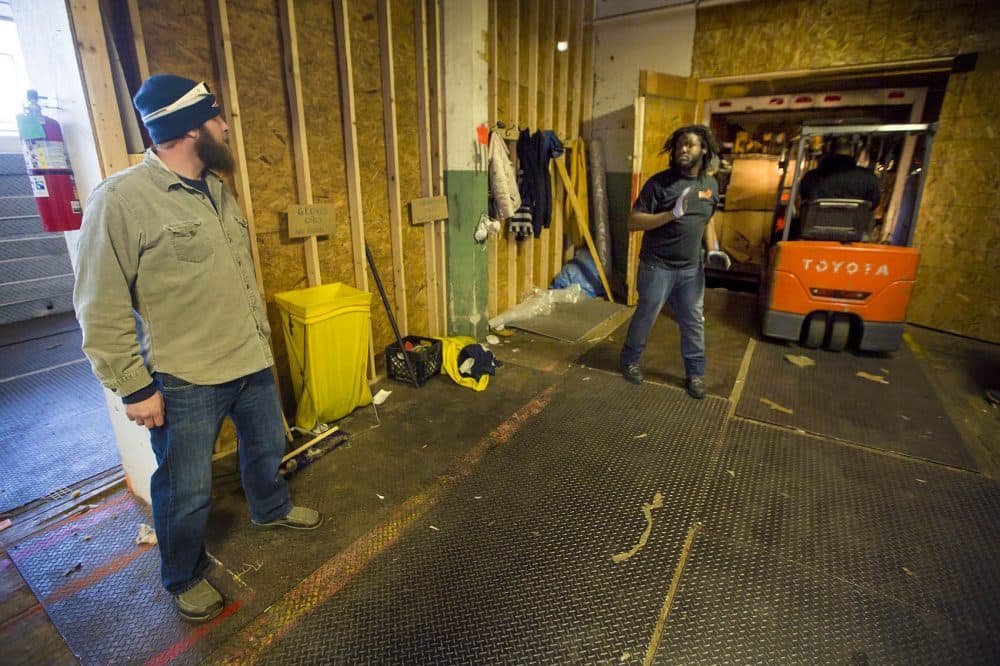
"There's a lot on teamwork in here," Buccholz says. "We don't have one person grab a king size mattress and drag it around. You got to work together, so you rely on the person standing next to you a lot of the time."
And sometimes your coworker can be a member of a rival gang. Call it a workplace lesson in peaceful coexistence.
It's estimated there are 30 youth gangs in the Lowell area, with 1,500 members. UTEC sends out teams of gang-savvy street workers into jails to do outreach and encourage those with criminal records and troubled histories to join the social, educational and employment programs UTEC offers.
'8, 9, 10 Chance Program'
But often life on the straight and narrow is not an easy sell.
"The first time I heard about them, they came to see me when I was incarcerated," says 22-year-old Jeff Alverez. "They came to see me. I turned them down, though. I was really into my gang banger stuff."
Alverez was serving his third jail sentence for stealing cars before he finally decided to join UTEC.
Today he's one of the 175 workers at UTEC. He's in woodworking. Alverez finished mattress recycling in record time.
"It took me 15 days to finish it," Alverez says. "Some people take a year, some people take six months. So, I went in there and I killed it."
"My job loves me. My mom is happy for me. This program is my life now," he says. "I wouldn't want to leave. If I could be here for another three, four, five years, I wouldn't mind doing it."
Actually, from first encounter to job to transitional counseling, UTEC spends about six years with each person. Croteau calls it a long-term investment.
"We'll never kick anybody out," he says. "For us, the big factor is just showing up."
But sometimes -- well, actually, many times -- entry-level mattress workers do not show up.
"We're never going to give up on a young person," Croteau says. "We know that there are going to be stumbles that they may have, but we'll never say we're a second chance program. We'll say that we have to be equipped to be an eight, nine, 10 chance program."
Do The Math
The motivator to show up in mattress recycling is money.
"If they show up one day, we'll pay them for the day," Frechette says. "If they don't show up the next day, that's OK, but they can expect a phone call from us to say, 'We miss you, we want you back.' We want to make it as easy for them to stay in programming as possible. So they keep coming back and then will move onto our other programming."
The bar is low but so is the pay: minimum wage.
Vinny Proeung has been trying to make it through the mattress recycling program on and off for five years, but it's been tough.
"I got court cases, I just came out of jail last year. I got a newborn child," he says. "I don't make enough money. After taxes, $36. It doesn't even pay for my rent. I pay a thousand dollars a month."
He says he can make more money on the street.
"Definitely, but I don't want my son growing up and thinking that that's the only way that he's going to be able to make it somewhere, is by going to the streets and doing this and that or things that I used to," Proeung says."But it's still tempting to go back to the streets."
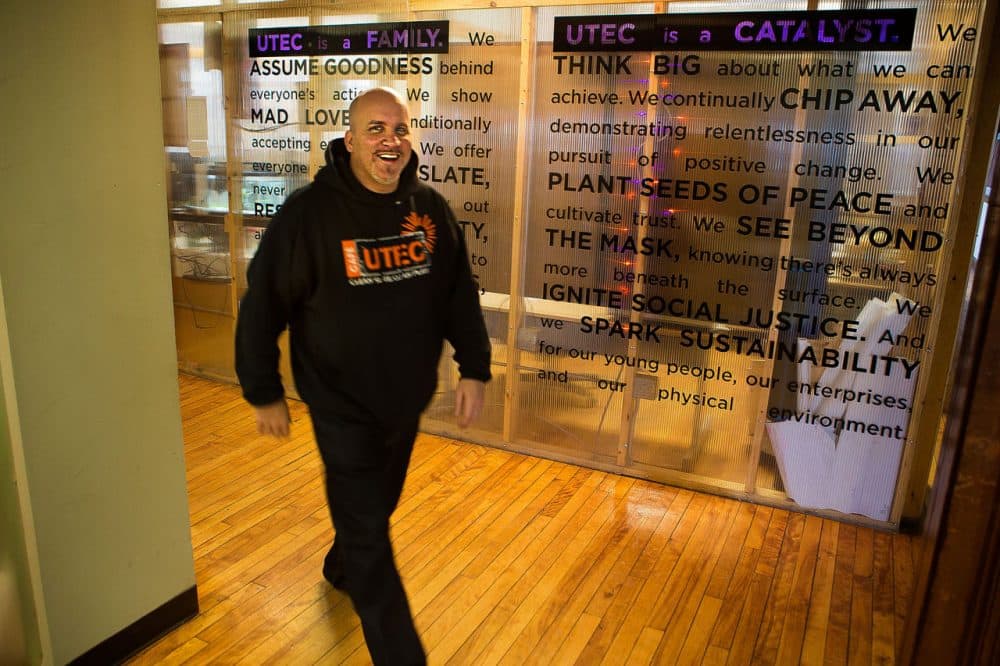
Croteau gets it. As the head of a nonprofit social enterprise he has to think in terms of dollars and cents, as well as the societal and human costs determining UTEC's bottom line.
Do the math: It costs $52,000 a year to keep a person in the local county jail for a year. Programming at UTEC is $20,000 a year, and that includes paychecks for a 30-hour-a-week job. And the recidivism rate in the UTEC program is less than half the jail's.
But those numbers tell only part of the story. At UTEC a major problem persists: the inter-generational cycle of poverty and crime. Half the young people in UTEC programs are parents.
"And so a big barrier for them showing up is having reliable consistent child care," Croteau says. "And so our new initiative is to develop what we're calling a two-generational center."
When the new on-site Gen2 center opens in a few weeks, Croteau says UTEC young people will be able to succeed as workers and parents.
"The idea of how can each young person be the number one teacher in their kid's lives, so how do we embed that into everything they're doing. Whether you're in the kitchen in our social enterprise here informing how you have healthy eating in your family, or the wood working shop and you're learning about toys from a child development perspective? We're real excited about where that can head."
Call it a triple bottom line success, where young people from gangs and jail get jobs, the UTEC social enterprise becomes more sustainable, and society, well, do the math.
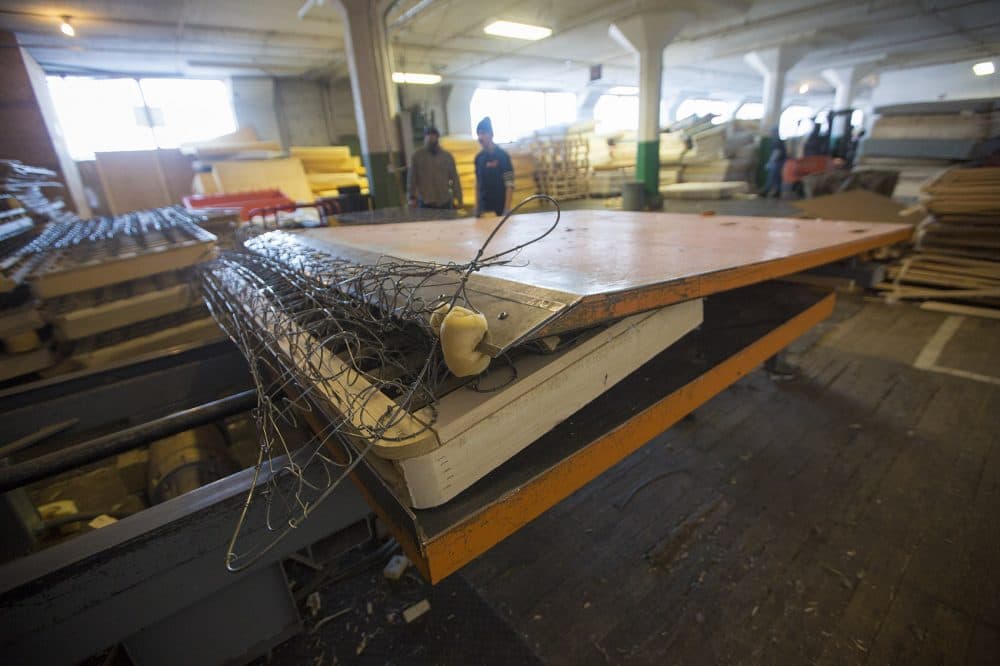
This segment aired on February 24, 2017.
